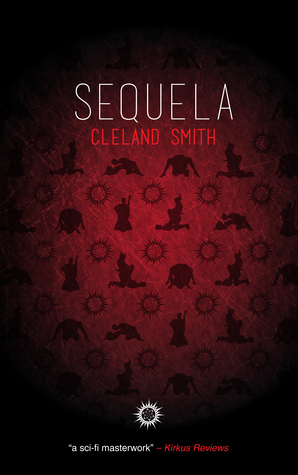Sequela is not a fancy plural of 'sequel' - I had to look it up to find that it means a slow / long-term / delayed effect of a medical condition. So, for instance, the herpes virus attacks the nervous system, which may result in brain damage that leads people to be unable to recognise animals, and other long-term harm to the brain. Which makes Sequela a great and fitting title of this novel, but it's still a word I doubt everyone knows.
The book tells the story of a scientist who moves from public-sector-funded academic research into commercial viral design in the private sector. Set in a future London which is strictly divided into The City (i.e. yuppieland) and the outside, with security checkpoints and all kinds of (legal, physical and social) barriers between the two, his job is to create sexually transmitted viruses(STVs). In this future, STVs have become fashionable - they indicate whom one has slept with, which in turn indicates a connection to power. Each symptom pattern is linked to different powerbrokers, and every 'player' is trying to have the most prestigious rash pattern. Our hero, however, has different ideas for what viruses could be used to achieve: instead of rashes, they could make the wearers more beautiful - and cement the fashionability of infections.
This is also a world where infections are a choice - people have implants that replace their immune systems and screen for viruses, giving them control over what they do and don't allow to affect their health. The implants, of course, are expensive, and only the well-off have them. As a hobby, our hero wants to create a different method to work the immune system, through easily transmitted viruses, rather than expensive artificial implants.
It's high concept, but really, this is a character-based thriller. The book starts with a tense job interview and grows from there, never letting up tension, and indeed driving it up with every chapter. The tension comes from social interactions, from office politics, from personal relationships and how they develop - as well as the threat that viruses (and viral attacks) represent.
It's stunningly realised, with each character believable and not always predictable, each social interaction authentic and natural, each dialogue utterly convincing. All that, and with a plot that gradually gets more and more tense, without ever descending into action-movie blockbuster nonsense.
I'm very, very impressed with the craftsmanship of this novel. I would cheerfully recommend it to anyone with an interest in scifi and some tolerance of occasional sex in literature: although it stays broadly unpornographic in descriptions of the encounters, the text is necessarily full of sexual events.
Rating: 5/5
The book tells the story of a scientist who moves from public-sector-funded academic research into commercial viral design in the private sector. Set in a future London which is strictly divided into The City (i.e. yuppieland) and the outside, with security checkpoints and all kinds of (legal, physical and social) barriers between the two, his job is to create sexually transmitted viruses(STVs). In this future, STVs have become fashionable - they indicate whom one has slept with, which in turn indicates a connection to power. Each symptom pattern is linked to different powerbrokers, and every 'player' is trying to have the most prestigious rash pattern. Our hero, however, has different ideas for what viruses could be used to achieve: instead of rashes, they could make the wearers more beautiful - and cement the fashionability of infections.
This is also a world where infections are a choice - people have implants that replace their immune systems and screen for viruses, giving them control over what they do and don't allow to affect their health. The implants, of course, are expensive, and only the well-off have them. As a hobby, our hero wants to create a different method to work the immune system, through easily transmitted viruses, rather than expensive artificial implants.
It's high concept, but really, this is a character-based thriller. The book starts with a tense job interview and grows from there, never letting up tension, and indeed driving it up with every chapter. The tension comes from social interactions, from office politics, from personal relationships and how they develop - as well as the threat that viruses (and viral attacks) represent.
It's stunningly realised, with each character believable and not always predictable, each social interaction authentic and natural, each dialogue utterly convincing. All that, and with a plot that gradually gets more and more tense, without ever descending into action-movie blockbuster nonsense.
I'm very, very impressed with the craftsmanship of this novel. I would cheerfully recommend it to anyone with an interest in scifi and some tolerance of occasional sex in literature: although it stays broadly unpornographic in descriptions of the encounters, the text is necessarily full of sexual events.
Rating: 5/5

No comments:
Post a Comment